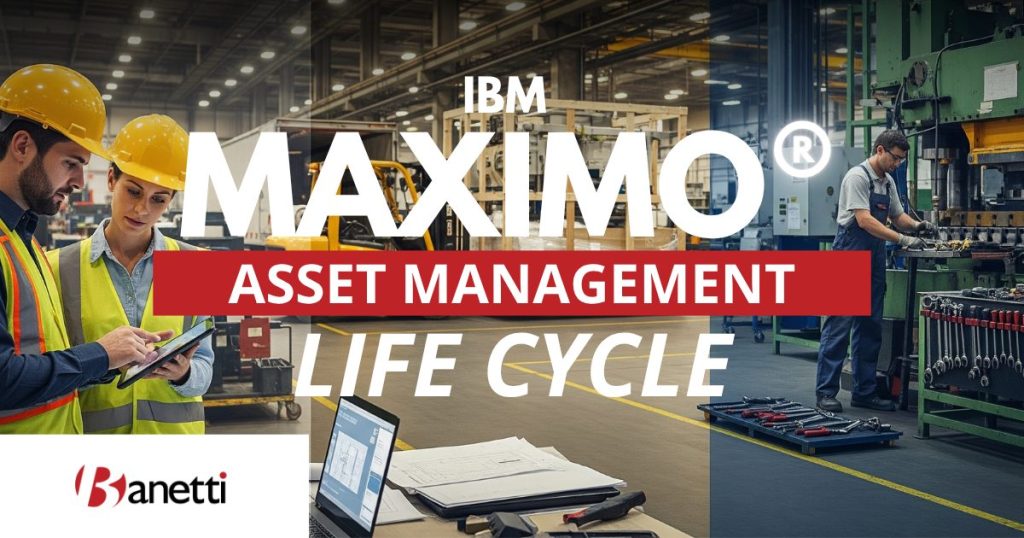5 Min Read
Table of contents

Effective asset lifecycle management (ALM) is crucial for organizations aiming to enhance asset reliability, ensure regulatory compliance, and optimize return on investment (ROI). Assets throughout their lifecycle require intricate asset management processes and advanced technologies, making it essential to utilize comprehensive solutions.
IBM Maximo® Asset Management software emerges as a robust and holistic solution that efficiently oversees every phase, from meticulous planning and strategic acquisition to operation, maintenance, optimization, and eventual decommissioning. Leveraging centralized control, advanced data analytics, and automation, IBM Maximo® helps enterprises gain unparalleled visibility, streamline operations, and ensure sustainable asset performance management practices.
What Is Asset Lifecycle Management (ALM)?

Asset lifecycle management (ALM) refers to the structured and strategic approach to managing physical assets from their initial acquisition to their final disposal. It involves systematically optimizing asset usage, controlling costs, minimizing downtime, and enhancing overall asset performance to ensure maximum operational efficiency.
The primary goals include maximizing uptime, optimizing operational and maintenance costs, and significantly extending asset lifespan to ensure sustained performance and asset value generation.
The Role of IBM Maximo® in ALM
IBM Maximo® provides centralized control, invaluable data insights, and efficient process automation capabilities. Through advanced analytics, AI-driven solutions, and IoT integration, the application suite allows enterprises to manage their assets strategically, proactively address potential issues, and streamline complex workflows.
Phases of the IBM Maximo® Asset Management Life Cycle

IBM Maximo® divides asset lifecycle management into distinct, manageable phases, ensuring clarity, organization, and precision at every stage.
1. Planning & Valuation
Effective planning involves thorough feasibility studies, detailed budgeting, and the strategic use of digital twin modeling. These elements enable accurate forecasting of asset risk and expected ROI, empowering informed decision-making.
2. Procurement & Acquisition
This phase includes vendor selection, issuing purchase orders, and detailed asset registration. Ensuring compatibility and seamless integration with IBM Maximo® is vital for accurate data management and efficient operational transition.
3. Installation & Commissioning
Proper installation protocols and meticulous configuration alongside systematic data logging form the core of this phase. IBM Maximo®’s commissioning checklists help ensure new assets meet operational standards and compliance requirements.
4. Operation & Maintenance (Utilization)
In this phase, preventive maintenance, as well as predictive and condition-based maintenance approaches, are critical. IBM Maximo® uses real-time IoT sensor data to effectively manage work orders, inventory, and routine maintenance, minimizing downtime and maintenance expenses.
5. Performance Optimization
Continuous improvement is achieved by utilizing AI-driven anomaly detection, strategic cost control, and performance optimization based on precise IBM Maximo® KPIs. Real-time data analysis ensures continuous operational enhancement and asset reliability.
6. Decommissioning & Disposal
This final phase involves strategic planning for retirement, resale, and recycling. Maximo ensures comprehensive compliance and historical tracking to manage sustainable, regulatory-compliant asset disposal.
How IBM Maximo® Supports Each Lifecycle Stage

IBM Maximo® is designed to support organizations at every lifecycle stage through comprehensive data management, predictive capabilities, and workflow automation.
Unified Asset Database
IBM Maximo® consolidates all lifecycle data into a single, easily accessible platform, significantly improving asset management efficiency and decision-making accuracy.
Real-Time Monitoring & IoT Integration
Utilizing real-time data from IoT sensors, IBM Maximo® proactively supports condition-based maintenance, preventing asset failures and unexpected downtime.
Predictive Analytics with AI
Through advanced predictive analytics and machine learning, IBM Maximo® enables enterprises to anticipate maintenance needs, optimize schedules, and boost operational efficiency.
Automated Workflow Management
Automation of workflows within IBM Maximo® streamlines maintenance processes, including work orders, escalations, and approvals, ensuring assets remain at peak operational efficiency.
Benefits of Lifecycle Management with IBM Maximo®

Organizations leveraging IBM Maximo® experience numerous strategic benefits that enhance asset management effectiveness.
- Reduced Total Cost of Ownership: IBM Maximo®enables organizations to proactively manage maintenance, significantly reducing maintenance costs and extending the useful life of assets, thus lowering overall expenses.
- Improved Uptime and Reliability: By continuously monitoring asset health and performance, IBM Maximo®helps minimize downtime, enhance reliability, and ensure critical assets are always operational.
- Better Compliance and Reporting: IBM Maximo®simplifies compliance and reporting through automated data collection and centralized documentation, making regulatory audits straightforward and transparent.
- Prolonged Asset Life: Strategic asset management practices and predictive maintenance significantly extend asset lifespan, enhancing the long-term value derived from investments.
- Enhanced Sustainability Tracking: IBM Maximo®facilitates tracking asset performance metrics, allowing organizations to measure and optimize their environmental impact, promoting sustainable asset management.
Best Practices for Maximizing IBM Maximo®’s ALM Capabilities

To fully leverage IBM Maximo®’s capabilities, organizations should adopt several best practices that optimize lifecycle management.
- Adopt Digital Twin Models in the Planning Stage: Utilizing digital twin technology provides accurate forecasts and insights, helping stakeholders understand potential risks and expected performance before asset deployment.
- Use Real-Time Condition Monitoring: Real-time monitoring using IoT sensors enables organizations to detect potential issuesimmediately, enhancing maintenance response times and reducing asset failures.
- Review Lifecycle Performance Metrics Regularly: Regularly assessing lifecycle performance metrics helps organizations continually refine their strategies, ensuring optimal asset performance and efficiency.
- Ensure Accurate and Consistent Data Entry: Consistent and accurate data entry ensures the reliability of analytics and reporting, thereby enhancing decision-making accuracy and overall asset management effectiveness.
- Plan Early for Asset Decommissioning: Early planning for asset decommissioning ensures regulatory compliance, minimizes environmental impact, and optimizes financial returns from retired assets.
Conclusion
Organizations adopting the asset management lifecycle application, supported by Banetti’s expert enterprise asset management consulting services, can achieve unparalleled asset lifecycle management success. Banetti specializes in implementing and optimizing IBM Maximo®, enabling businesses to fully capitalize on the platform’s extensive capabilities, ensuring strategic control, significant cost efficiencies, and robust performance reliability.
Through Banetti’s guidance and IBM Maximo®’s advanced functionalities, enterprises can establish sustainable, efficient, and highly effective asset management practices.
Learn more.


